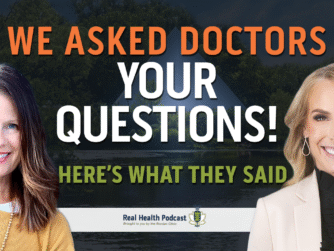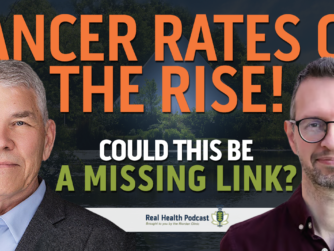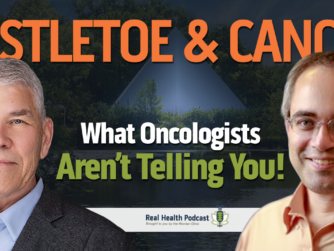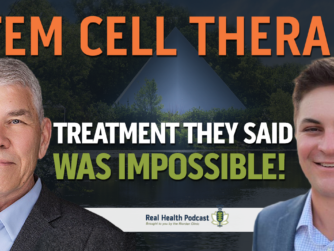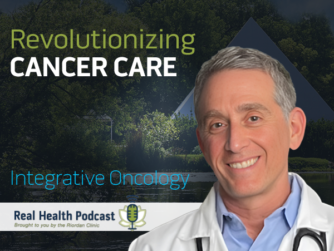Dr. Ron Hunninghake, MD, Chief Medical Officer, and Dr. Lucas Tims, ND, FABNO, continue their discussion about the terrain approach to integrative oncology in this bonus episode of the Real Health Podcast. Today’s episode features two of the 10 terrains: Immunity and Microbiome and their impacts on cancer. Dr. Ron and Dr. Lucas explain how genetics are only part of the equation when it comes to treating cancer and caring for the whole person.
Thank You To This Episode’s Sponsor
Episode Links and Promotions
Metabolic Terrain Institute of Health
Episode Transcript
Disclaimer: The information contained on the Real Health Podcast and the resources mentioned are for educational purposes only. They are not intended as, and shall not be understood or construed as medical or health advice. The information contained on this podcast is not a substitute for medical or health advice from a professional who is aware of the facts and circumstances of your individual situation. Information provided by hosts and guests on the Real Health Podcast, or the use of any products or services mentioned, does not create a practitioner-patient relationship between you and any persons affiliated with this podcast.
Intro: This is the Real Health Podcast, brought to you by Riordan Clinic. Our mission is to bring you the latest information and top experts in functional and integrative medicine to help you make informed decisions on your path to real health.
Dr. Ron Hunninghake: Welcome back everyone to the Riordan Clinic Real Health Podcast. I’m Dr. Ron Hunninghake, chief medical officer here, and I’ve got Dr. Lucas Tims, who is one of our integrative oncologists in Overland Park, again today. Dr. Lucas, welcome.
Dr. Lucas Tims: Good to be with you again, Dr. Ron.
Dr. Ron Hunninghake: We’re going to continue our series on the Terrain Based Approach to Cancer. We’ve been exploring the ten metabolic terrains that strongly impact cancer outcomes that we deal with extensively here at the Riordan Clinic. And so, just to remind our listeners we have already talked about epigenetics, metabolics, environmental toxins, inflammation, angiogenesis. We’re going to move in today and discuss the role of immunity and the microbiome. And so really, as I looked at this, Dr. Tims, I really thought this, we’re kind of like crescendo-ing here because I think when you start mentioning immunity, you’re getting right at the heart of what’s going to help people overcome their cancer. So how does that play out in your mind?
Dr. Lucas Tims: Yeah, I totally agree. The immunity is a key piece of the big puzzle that we’re talking about here. The immune system is basically why anyone gets cancer in the first place.
Dr. Ron Hunninghake: Wow.
Dr. Lucas Tims: And so, our immune systems, most people don’t realize, are designed detect and get rid of cells that are going down that cancer pathway every day and prevent them from getting to that point, or at least prevent them from getting to the point where enough of them get together and form a tumor. And so really what allows a tumor to form or a cancer disease to set in place is the immune system being suppressed. And so much of what we deal with the diet and lifestyle modifications, getting at root causes, it’s all in an effort to get that immune system back on track for people so that their body can start doing what it’s supposed to do. It can start working for them instead of against them.
Dr. Ron Hunninghake: A better audience would be surprised to know that this is not new at all. There was back, I don’t know, 80, 90 years ago, Coley’s toxins. There was a doctor that found out that giving people strep … Is it strep or staph toxins? Staphyloccal toxins activated the immune system and helped them to get over their cancers. You remember that story?
Dr. Lucas Tims: Yeah. William Coley.
Dr. Ron Hunninghake: Ah.
Dr. Lucas Tims: They actually still give out an award at Memorial Sloan Kettering for research, doctors, research doctors for an accomplishment of sorts every year. And I think most of them don’t really know what Coley actually did, but it’s kind of ironic. Yeah, Coley’s toxins. This is basically proof of concept that you can stimulate the immune system in a way like an infection or giving a patient an inoculation of pathogenic bacteria that stirs up their immune system. And guess what? When the immune system gets stirred up, even if the infection is what causes that, it has benefits towards fighting cancer and doing other things. It kind of snaps it back into place a little bit.
And so we see this with some of the therapies that we offer here. Not to that extent. We’re not inoculating people with bacteria, but the mistletoe therapy that we use works in a very similar fashion in terms of creating or stirring up the immune system. There are some toxins in the mistletoe, but they’re safe enough to give at the way we do it. But that is essentially what we’re creating, is an immune response that then translates towards the cancer benefits.
Dr. Ron Hunninghake: Yeah. And Coley’s was kind of going back in history, but now on the cutting edge of modern oncology, immunology is really the superstar. Isn’t that about true? And all these new medicines that are coming out. They’re coming out by the hundreds, it seems.
Dr. Lucas Tims: Yeah, it’s becoming a very big part of modern oncology. Immune oncology is sort of becoming a specialty in and of itself. And most tumor types have had immunotherapy drugs tested in them, and most of them do have some response. It’s funny though, even these modern drugs, some people may have heard of or seen commercials for, drugs like Keytruda, Opdivo. These are the types of drugs we’re talking about.
Dr. Ron Hunninghake: Yeah.
Dr. Lucas Tims: And what they do, they’re also called checkpoint inhibitors, and they can really accelerate the immune system very quickly in respect of a response towards certain cancer cells that are trying to evade it. And so this PDL1 marker is kind of where that checkpoint inhibition happens. And so these drugs, I tell patients that if you think of your immune system like a race car, these drugs are like slamming down the … It’s literally like laying a brick on the accelerator. And if the car’s in really good shape, then when you hit the accelerator, it might do well. But if your car’s in really crappy shape, hasn’t had a pit stop in a few hundred laps and the tires are falling off and you hit that accelerator, bad things can happen.
Dr. Ron Hunninghake: Huh.
Dr. Lucas Tims: You might not make that first turn and go straight into the wall. And so I talk about all the things that we do, are making sure that car, that race car, is tuned up and the spark plugs are changed, fresh tires, good fuel in the tank, so that when they hit that accelerator, it’s ready to run. And we see that play out with a lot of patients who are on immunotherapy, where if we get their race car in really good position, they’ll have a better response.
Dr. Ron Hunninghake: So you’re actually talking about terrain therapy, which is what we do in this whole series of looking at these 10 terrain-based factors that we’re trying to help people tune up, like tuning up their race car, so that they’ll be fit and ready to deal with their cancer in a more effective way. And so, and it was interesting to me that we actually do measure the immune system pretty regularly with people in terms of what’s this trifecta notion. We’re looking at not only inflammation, but we’re looking at the neutrophil-to-lymphocyte ratio. And that can have a bearing on what’s going on with the patient as well.
Dr. Lucas Tims: Yeah. The neutrophil-to-lymphocyte is a good one to watch. There are more specialized lymphocyte tests, like natural killer cell tests that are out there. I also like to watch the nagalase enzyme. That can be a little bit of a measurement of how well is the immune system responding to cancer. So yeah, there’s lots of blood markers that we can actually see in real time. What’s the shape of your race car? Is it ready to run that race?
Dr. Ron Hunninghake: Yeah. And then, also looking back, the thing at my 34 years here at Riordan Clinic has one of the cornerstones of our approach to cancer is intravenous vitamin C. And I go back to Dr. Levy’s book, “Curing the Incurable.” He showed that there were 18 different ways that vitamin C impacts the immune system. And so, just getting enough vitamin C going and using the Riordan IVC protocol, it’s a type of immunotherapy. It’s never been looked upon that way, but certainly it helps people to balance their response, as well as to heighten it so that they have a better chance of fighting the cancer.
Dr. Lucas Tims: Yeah. Vitamin C basically is one of the main … Again, going back to that race car, it’s one of the main things that makes up the fuel in the tank of the race car.
Dr. Ron Hunninghake: Yeah. Don’t want to leave out vitamin D either. Vitamin D we found to be crucial in terms of helping people get through the pandemic with not dying and not getting severely sick, and so we monitor vitamin D levels very, very closely as well. So there’s a number of different ways. Then you get into other lifestyle factors, like sleep, your diet, the phytonutrients in your diet, all of these impact your immune system. If you’re eating a lousy diet, your immune system’s going to go to pot.
Dr. Lucas Tims: 100%. This is where, like we talked about in the beginning, all things kind of merge here at the immune system, whether it’s stress, sleep, diet, exercise, hormones, and nutrients. All these things are sort of orchestrating a healthy immune response.
Dr. Ron Hunninghake: Yeah. So, and I think the terrain-based approach is really not one thing. It’s a symphony of various elements of the orchestra, and so this concept of orchestration is really important. So this is a little bit hard for people to understand in the beginning, because we’re used to going to the doctor, and in this case, the oncologist, and here’s the therapy, here’s the prescribed therapy. And what we’re saying, yeah, that’s important, but we have to look at the foundation of our health from many different perspectives, 10 different perspectives in the case of terrain theory. And if we can get those orchestrated and tuned properly, we’re going to have better outcomes, longer lives, fewer side effects.
Dr. Lucas Tims: Absolutely. It’s looking at it more from a … instead of fighting disease, let’s create more health.
Dr. Ron Hunninghake: Yeah.
Dr. Lucas Tims: And real health, as we like to say here at the Riordan Clinic, and on the Real Health Podcast.
Advertisement: There’s a lot more to this conversation and it’s coming up right after a quick break. Today’s podcast is brought to you by Bio-Center Laboratories. The Bio-Center Laboratory provides state-of-the-art lab testing and diagnostic services for healthcare providers, laboratories, hospitals, and the general public. Lab tests available through Bio-Center include a comprehensive list of vitamins, minerals, fatty acids, amino acids, hormones, and pyrroles. They also provide a variety of standardized tests for disease markers. These markers include cardiovascular disease, diabetes, thyroid dysfunction, hormone imbalance, and more. Visit biocenterlab.org to learn more.
Dr. Ron Hunninghake: We want to talk a little bit now about another important part of the immune system, and really they go hand in hand, and this is the microbiome. So most people by now, probably our listeners are aware that the bacteria that line our digestive system outnumber us by, what? More than 10 to one. Maybe some people even say even higher than that. Maybe a hundred to one.
Dr. Lucas Tims: I think it’s a hundred. Closer to a hundred to one. Yeah.
Dr. Ron Hunninghake: A hundred to one. And these bacteria really have many different ways that they impact our immune system. So let’s just kind of just start naming off some ways. What do you think of in terms of how the microbiome impacts immunity, Dr. Tims?
Dr. Lucas Tims: Well, our microbiome is, we have bacteria and other organisms living all over our body, but really where it’s concentrated is in our gut, or more technically in our digestive system. And because this is really when you think about it, besides our skin, this is the only sort of entryway into our body, is through that tube that goes from your mouth all the way down to the bottom. And so this is where we have sort of a very concentrated group of organisms that essentially their main goal is to make sure that foreign invaders, threats to the system do not get in. Or if there is a problem, if the army’s storming the castle, these are the guys that are right up front and making sure that we’re making the right preparations, having the right response.
And so that’s the direct connection between how does our immune system know to respond and what to respond to, is through our microbiome, through these organisms that are literally on the front lines of our bigger organism body, making sure that we keep it alive and keep it safe, because we are a host for these organisms as well, and they’re in the interest of wanting to stay alive too.
Dr. Ron Hunninghake: Yeah. And back to the old aphorism, “You are what you eat,” we’re now finding out that literally is true and that there are a host of things in the modern diet, excessive sugar, the polyunsaturated bad oils, hydrogenated oils.
Dr. Lucas Tims: Yeah.
Dr. Ron Hunninghake: A lot of people are sensitive to gluten and other food sensitivity issues. All of these can set you up for what they’re calling leaky gut. How does leaky gut play into our immune system? How does it play into our propensity for all illness, including cancer?
Dr. Lucas Tims: Yeah. Leaky gut, it’s a key concept. And I think it’s gotten a little bit overused through the years. And I think that it’s almost gotten … It’s gotten a bad rap. And evidence-based people say, “Well, leaky gut doesn’t really exist.” You’re better off thinking of it as intestinal permeability, and that’s actually the name that you’ll find in a lot of the scientific research that’s been done, because, again, leaky gut’s just kind of gotten a bad rap. But intestinal permeability is what we’re talking about.
This is going back to that, again, we have sort of this frontline group of organisms that lined our digestive tract and create sort of a barrier of sorts. And they’re the ones that decide, sort of like through these tolls, what gets passed and what doesn’t. And then the point is to keep the rest of the organism safe and not let things pass through that aren’t supposed to be in us. And over time, that barrier, that lining, can become more permeable, which is just a fancy name for you get kind of holes in it like Swiss cheese. And all of a sudden you’re missing parts of the lining where things would be getting vetted before they get passed through, into our body, and things end up getting into us that shouldn’t be in us, whether it’s pathogens or proteins that we can’t digest fully or toxins, and this leads to further systemic diseases.
And so, like you said, everything from our diet to chemicals in the foods now to prolonged chronic stress hormones in the system to bad sleep, lack of exercise, this does affect that lining, and ultimately can contribute to that increased intestinal permeability.
Dr. Ron Hunninghake: Which, if it’s in excess, if the permeability is in excess, that’s going to put more stress on our immune system because the immune system has to clean up the mess that we allow to get in if we’re eating a bunch of junk stuff. So this is why it’s really important for people to think about their diet as, and that’s kind of a foundation of natural terrain-based cancer care, is a healthy diet. So maybe let’s talk just a minute about what would be the constituents of a really healthy diet for someone who’s trying to deal with cancer, with the idea that it’s going to help improve their gut health.
Dr. Lucas Tims: Yeah, I think there are some sort of staples to that. It’s interesting, we see that in different tumor types and in different phases of treatments, the diet can be customized a lot of different ways for different people. And so we never just take a cookie cutter approach, but there are some staples that everyone can sort of add into their diet that I think will generally help. I think you’re never going to get into a problem if you’re pushing lots of fiber, green leafy vegetables, foods that are rich in polyphenols. We talk about berries and green leafy veggies again, certain types of teas. Dark chocolate, believe it or not.
Dr. Ron Hunninghake: Yay.
Dr. Lucas Tims: Very rich in polyphenols. So my patients always love it when I literally prescribe them dark chocolate. Coffee to a certain extent as well, that’s organic. And so, those are some things that people can add in. It’s a pretty general prescription for most people. Again, I don’t think anybody should take this information we’re talking about right now and make a treatment plan out of it. You should always talk to your doctor. But a diet, there’s some healthy hallmarks that certainly can increase your immune function and your body’s ability to fight cancer on its own.
Dr. Ron Hunninghake: Yeah. There was a famous book years back that kind of got lost in this shuffle, but it was called “The Color Code.” And it’s basically the idea that nature coded in the best foods for us to eat. The more colorful, the deeper the colors, and then than we would like fresh and organic and those kinds of things. But these predominantly plant-based foods are really good sources of polyphenols and phytonutrients are going to help us fight the cancer and maintain good gut health.
And then one of the interesting things that’s coming up is that the gut microbiome ties into the intracellular biome, which would be a whole other podcast, namely your mitochondria. So if you keep your gut in good health, you’re going to maintain good, healthy mitochondria. And these are the energy sources within our cells, but they play a very important part in terms of helping us to ward off cancer and to recover from cancer as well.
Dr. Lucas Tims: I’m glad you brought up the mitochondria, because this is really where we see the microbiome sort of link up with the rest of our body. And most people don’t realize that the mitochondria in your cell are actually like fossils from bacteria.
Dr. Ron Hunninghake: Yes.
Dr. Lucas Tims: And way back years ago, when the body sort of evolved to live with these microorganisms, this was that symbiotic relationship that we created. And so, and unfortunately we do a lot of things that disrupt these mitochondria, and that’s part of why people get cancer as well. And so that’s a whole other podcast, like you said, but the mitochondria is a key point.
Dr. Ron Hunninghake: Yeah. Apoptosis is controlled by the mitochondria. And so, if the mitochondria aren’t working properly, you can’t take out injured cells. And so, you don’t think that would be related to what you eat and to your gut health, but it definitely is. So really today, we’ve really touched on some pretty esoteric concepts, but it comes down to learning how to make better food choices, learning how to take better care of yourself and realizing that you have the power to influence the outcome or improve the outcome of whatever chemotherapy or whatever conventional therapy is being recommended for your cancer. So this is the immune system in the microbiome. We’re going to talk the next time a little bit about stress and how that can affect all of this. But any last thoughts for today? I’ll give you the final word here, Dr. Tims.
Dr. Lucas Tims: Well, the final word I think would be take care of your immune system, and if you are not supporting your immune system and your microbiome in that relationship, I think you’re going to find a hard time really putting up a good fight against any sort of cancer. And so this is a key part of this. It’s a key part of what we do and you really need to work with somebody to make sure that your immune system’s … That that race car’s ready to run the race and that it’s not going to crash into the wall when it’s time to hit the road. So that’ll be my final word.
Dr. Ron Hunninghake: That’s excellent. Thank you so much for a wonderful session today. And we’ll be back next time with the terrain-based approach to cancer. Thank you, Dr. Tims.
Outro: Thank you for listening to the Real Health Podcast. If you enjoy this episode, be sure to subscribe and leave us a review. You can also find all of the episodes and show notes over at realhealthpodcast.org. Also, be sure to visit riordanclinic.org, where you will find hundreds of videos and articles to help you create your own version of real health.


